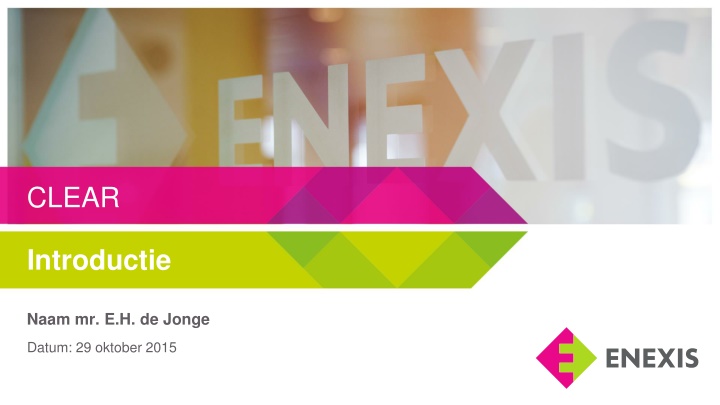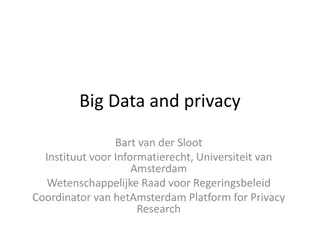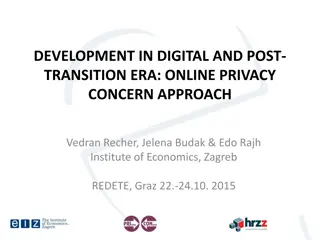Privacy Concerns and Energy Trends: A Look into Achmea's Data Collection Strategy
Achmea, a leading insurer, is offering discounts in exchange for personal data through monitoring devices in homes and cars. This move raises concerns about privacy as companies increasingly value personal data. Meanwhile, the market is witnessing a shift towards electric vehicles due to fiscal benefits, with predictions of substantial growth in the electric car segment. Additionally, insights from energy market analysis point to a future dominated by intermittent renewables and cheap fossil fuels. The cost of shale gas is rapidly decreasing, indicating changes in the energy landscape. These developments highlight the intersection of data privacy, energy transitions, and market dynamics.
Download Presentation

Please find below an Image/Link to download the presentation.
The content on the website is provided AS IS for your information and personal use only. It may not be sold, licensed, or shared on other websites without obtaining consent from the author.If you encounter any issues during the download, it is possible that the publisher has removed the file from their server.
You are allowed to download the files provided on this website for personal or commercial use, subject to the condition that they are used lawfully. All files are the property of their respective owners.
The content on the website is provided AS IS for your information and personal use only. It may not be sold, licensed, or shared on other websites without obtaining consent from the author.
E N D
Presentation Transcript
CLEAR Introductie Naam mr. E.H. de Jonge Datum: 29 oktober 2015
Achmea biedt korting in ruil voor privdata Verzekeraar wil via kastje in huis of auto gegevens verzamelen Wen er maar aan: steeds nadrukkelijker zullen bedrijven hengelen naar uw data. Persoonsgegevens zijn het nieuwe goud en steeds meer geld waard, zegt Merel Eilander van het College Bescherming Persoonsgegevens. Ze reageert op het voorstel van verzekeraar Achmea, dat klanten premieverlaging wil bieden als ze meetkastjes in huis en auto plaatsen en de data delen met de verzekeraar. Door: Huib Modderkolk 1 oktober 2015, 20:15 Zo kan de verzekeraar zicht krijgen op het rijgedrag of de veiligheid van het huis. 'Als de klant veiliger woont, hebben wij minder schade', legde directeur Albert Spijkman in het FD uit. 2
1 oktober 2015 Zakelijke rijders zullen vanwege fiscale voordelen steeds vaker kiezen voor volledig elektrische auto s. Het marktaandeel van deze auto s zal daardoor snel groeien, van 1% nu naar 7% in 2020. Dat worden 30.000 nieuwe elektrische auto s per jaar. Dat voorspelt het Economisch Bureau van ING Bank. Het bureau sluit zelfs niet uit dat de groei nog groter en sneller zal zijn. 3
Marketdevelopment Slide 1 van de presentatie over System analysis within energy market. Michael Liebreich, the founder of Bloomberg New Energy Finance, set out the trends upending the global energy markets and ushering in what he termed an age of plenty. He said: 1. Cheap fossil fuels are here to stay because production costs are tumbling. 2. Intermittent renewables will dominate electricity supply by 2040, with huge challenges for grid managers. 3. Electricity demand is flattening out, losing its link with economic growth. The implication is that energy will be plentiful for years to come, Liebreich said in a presentation Tuesday at the research group s conference in London. Oil will linger closer to $50 a barrel than to $90, and renewables will gain market share, he said. 5
Heres what he identified: The cost of shale gas is plunging rapidly ... 7
Solar as a solution Bil Gates: ( 2015) On why the free market won t develop new forms of energy fast enough: Well, there s no fortune to be made. Even if you have a new energy source that costs the same as today s and emits no CO2, it will be uncertain compared with what s tried-and-true and already operating at unbelievable scale and has gotten through all the regulatory problems, like Okay, what do you do with coal ash? and How do you guarantee something is safe? Without a substantial carbon tax, there s no incentive for innovators or plant buyers to switch. 9
Bill Gates (2015): So if you go back to various energy innovators, actually, they didn t do that well financially. The rewards to society of these energy advances not much of that is captured by the individual innovator, because it s a very conservative market. So the R&D amount in energy is surprisingly low compared with medicine or digital stuff, where both the government spending and the private-sector spending is huge 10
Share of Fuels in the Global Energy Mix Across Modern History 11
Al Gore: Generation Investment Management, a company that is rarely mentioned in press coverage of Gore but that he says is as ambitious as his other efforts. The most sweeping way to describe this undertaking is as a demonstration of a new version of capitalism, one that will shift the incentives of financial and business operations to reduce the environmental, social, political, and long-term economic damage being caused by unsustainable commercial excesses. What this means in practical terms is that Gore and his Generation colleagues have done the theoretically impossible: Over the past decade, they have made more money, in the Darwinian competition of international finance, by applying an environmentally conscious model of sustainable investing than have most fund managers who were guided by a straight-ahead pursuit of profit at any environmental or social price. 12
The role of market versus government In his book Capitalism 4.0, published in the wake of the worldwide crash of 2008 09, the British financial writer Anatole Kaletsky argued that capitalism has survived so long because of its ability to adapt and mutate. In times of deep crisis the brutal inequality of the first Gilded Age, the mass unemployment of the 1930s, financial instability and environmental pressures today governments sooner or later intervene. At these historic moments, when the capitalist system appears to be in its death-throes, it also seems incapable of radical reform, he wrote. But just then, politics kicks in to shake up institutional structures [and] a reformed version of capitalism takes shape. 13
Blood ( partner of Gore) Blood developed an enduring interest in the way a firm s internal culture governed its success. There were companies that had the same toxic short-term culture in those days Drexel, Salomon, Bear Stearns, Kidder, Lehman, he told me. They re all gone. If you look at what happened to them, it was all failures of culture: governance, leadership, incentive structures, values. That s why they failed. And that was the beginning of my view that long-term business success requires a holistic view, involving teamwork, integrity, values. It was obvious that we were both searching for the same holy grail, Gore told me, which was a way to manage assets with sustainability built into every part of the model. 14























